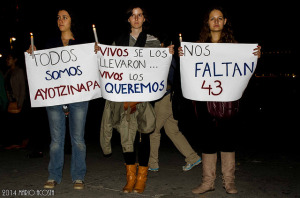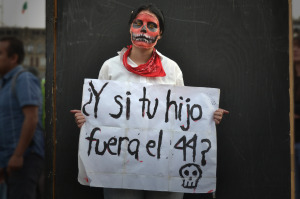Amid Global Protests, Mexican Officials Announce that Missing Students are Likely Dead
More than a month after 43 students disappeared in Mexico, attorney general Jesus Murillo Karam has come forward saying that gang members have admitted to killing them. In a press conference given Friday November 7, Murrillo said that authorities have recovered human remains thought to belong to the missing students, and that members of a drug cartel have confessed to the killings. This sobering news comes only after weeks of protests by citizens in Mexico and around the world, demanding answers from the government. The Caravel first reported on this story in October, when word spread that on September 26th, 43 students from a teacher training college went missing in Iguala, in the Mexican state of Guerrero, following a confrontation with municipal police. The students had traveled to Iguala from the neighboring town of Ayotzinapa to stage a protest against discriminatory teacher hiring practices. On their way out of the city, their convoy was ambushed by police forces, and the resulting shootout ended with at least three
students dead and 55 missing. Fourteen quickly surfaced in the days following, but 43 people remained unaccounted for, and were feared to have been kidnapped by the police, who are notoriously corrupt, and maintain strong ties to the violent drug cartel Guerreros Unidos.
Now, everyone’s worst fears have been realized as attorney general Murillo Karam confirmed Friday that they have suspects in custody that confessed to murdering the students. The suspects were recorded detailing the gruesome way in which the students met their end. Once the students were handed over to them by police, they shot and killed all who had not already died via asphyxiation. They then piled the bodies onto a large pyre where they were burned in order to destroy DNA evidence. The charred remains were then put into garbage bags and dumped into the river.
Mexican authorities have recovered bags that they believe contain the students’ remains, but are having outside forensic agencies from Austria and Argentina conduct tests for confirmation. The parents of the disappeared students say that they will not accept the students are dead until this definitive proof emerges. Officials have warned, however, that recovering DNA evidence will be difficult given the extent to which the bodies have been burned.
During the press conference, Murillo Karam acknowledged that “the information we have obtained causes great pain in the families,” and insists that those responsible for the massacre will be brought to justice. Already, authorities have arrested a number government officials in association with the incident, including the mayor of Iguala, Jose Luis Abarca, and his wife, Maria de los Angeles Pineda. Abarca is reported to have ordered the police attack in the first place after hearing that the student demonstrations would disrupt a speech his wife was to deliver.
The incident has sparked outrage across Mexico and the world, as millions decry the event as the latest of a series of horrors resulting from Mexico’s ongoing battle with drug cartels. On November 6 people gathered in a central plaza in Mexico City for the third time to protest the kidnappings and demand answers. The crowd of 20,000 consisted of mainly other university students, but they were supported by citizens of all ages and occupations. Citizens around the world have also stood in solidarity with
mexico; Protesters in New York City erected a makeshift Day of The Dead memorial for the students, and in Buenos Aires, protesters have taken a petition to the Mexican embassy demanding an investigation into the murders, and prosecution for all of those involved.
People have taken to social media as well, using Twitter hashtags such as #AccionGlobalporAyotzinapa and #Yamecanse to show support and send a strong global message to the Mexican government that it must enact justice for the slain students. The later of these hashtags, “Ya me cansé” references the closing statements that Murillo Karam made in his public address, indicating that he has had enough of the drug-related violence that has led up to this massacre. Observers felt indignant at this statement, and quickly turned it into a hashtag expressing their frustration with the Mexican government’s inaction on the issue.
A sense of frustration only adds to the heavy air of sorrow that weighs heavily upon the Mexican people at the moment. This massacre stands as the most recent in a long list of murders related drug cartels. The growing influence of cartels in Mexico has resulted in at least 60,000 deaths since 2006, and widespread government corruption. The Mexican people are growing increasingly weary of this violence and insecurity.


